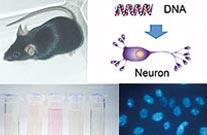Department of Bioscience and Engineering - Bioscience Course
About Bioscience and Engineering
In the bioscience course, the mechanisms of genetics and aging are elucidated through biotechnology, yielding solutions. Research efforts are directed toward the needs of an aging society, seeking out the causes of dementia due to aging and developing means of preventing it, for example, so that everyone can lead fulfilling lives in their later years.Research Domain
Biotechnology, biology, pharmacology, genetics, cells, microorganisms, environment, aging, dementia, hormones, proteins, enzymes, immunity, organic synthesis, bacteria, global environment, physiology, biopolymers, food hygieneResearch
What is aging? -The elucidation of the mechanism on neuronal aging-
FUKUI Koji
Our research is based on the free radical theory of aging. This famous theory is proposed by D. Harman in 1950s. Reactive oxygen species (ROS) attack living tissues and induce oxidative deterioration. The oxidative damage accelerates the risk of the development and progression of serious neurodegenerative diseases such as Alzheimer’s and Parkinson’s. In these severe diseases, neuronal cell death occur in the brain. In order to prevent ROS-related neuronal cell death, we are focusing on the event before induction of neuronal cell death. We found neurite degeneration before induction of cell death in vivo and in vitro models. Furthermore, we found microtubule destabilization and autophagy alteration. Recently, we have assessed the mechanism of Alzheimer’s disease using transgenic models. We are continuing to research the relationship between oxidative damage and neurodegenerative disorders.

Laboratories
Objectives in Education and Research
A major issue facing society in the 21st Century is that of maintaining a healthy lifestyle and cultural activities. A number of avenues are being explored to address this and include, establishing a series of preventative methods, treatments, and rehabilitation services for diseases that afflict the elderly such as cancer, circulatory diseases, and diabetes, as well as developing a preventative and control system of degenerative conditions present in the elderly. In other words, it is of importance to build an active society involving the elderly, and healthy ageing by exploiting scientific knowledge. Therefore, the Department is structured to foster individuals having a systematic approach in the comprehension of life, medical care, and welfare. The Department exposes students to understand the complexities of life, life phenomenon, and individual living functions, thereby having a greater insight into age-associated healthy living.
The research activities involve an understanding of the pathogenic mechanisms of ageing-associated degenerative changes that have yet to be understood thoroughly, and establish preventative methods based on scientific findings and diagnosis methods for biological dysfunctions developing with the onset of disease. Additionally, R&D is conducted towards medical and welfare apparatus, including advanced systems and methods that will allow for recovery from the onset of biological dysfunctions or control the condition.
The research activities involve an understanding of the pathogenic mechanisms of ageing-associated degenerative changes that have yet to be understood thoroughly, and establish preventative methods based on scientific findings and diagnosis methods for biological dysfunctions developing with the onset of disease. Additionally, R&D is conducted towards medical and welfare apparatus, including advanced systems and methods that will allow for recovery from the onset of biological dysfunctions or control the condition.